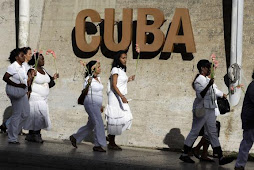New comedy wave tests limits on criticism in Cuba
By ANNE-MARIE GARCIA
HAVANA (AP) — Panfilo, the elderly protagonist in a weekly show on Cuban
state television, has a broken water pipe in his house. When the city
repair worker says it'll take six months to fix, Panfilo bribes her with
a bottle of shampoo and the repair is made the following day.
The audience bursts into laughter when the worker shows up in the next
scene with her hair fried by Panfilo's shampoo, stolen from parts
unknown and adulterated with mystery chemicals.
A new wave of Cuban comedians is drawing big broadcast audiences and
huge live crowds, using biting humor to take on corruption, shortages,
government inefficiency and other everyday problems in a country where
the government tolerates little dissent.
Comedian Luis Silva plays Panfilo, a senior citizen at the center of a
circle of friends and family on the Monday night show "Vivir del
cuento," which roughly translates to "Surviving By Your Wits."
Cuba doesn't release ratings information, but "Vivir del cuento" is the
closest state TV comes to water-cooler popularity for programming that
is usually a stultifying mix of public affairs, sports and subtitled
shows from the U.S. and other countries.
On Tuesday mornings, Cubans discuss the jokes from the previous
evening's show. Fans pack clubs and theaters in Havana and other cities
for live shows by Silva and comedians with similarly acerbic styles,
often waiting for hours to buy 20-peso (80 U.S. cents) tickets.
Silva "speaks to the social reality of our country with humor. He
doesn't cover things up. He makes us think, and I hope he makes the
people in power in this country think, too," teacher Yahima Morales said
as she left a live show in Havana late last month.
The jokes resonate deeply with Cubans frustrated by petty corruption,
scarcity of many goods and the poor quality of even the most basic staples.
The comics and their fans say the ability to publicly joke about the
failings of Cuba's stagnant, centrally planned economy is a sign of at
least a temporary loosening on the culture front.
The government has always allowed a certain amount of artistic freedom
to criticize the state in films such as "Strawberry and Chocolate" or
"Juan of the Dead." But the new comics poke fun at the struggles of
Cuban daily life in a way unimaginable in state media or a
state-sanctioned public performance a decade ago.
"Ten years ago this was unthinkable. Cuban television didn't touch these
complicated topics of Cuban society," said comedian Carlos Gonzalo, who
plays Mentepollo, a yakky know-it-all on the weekly show "Deja que yo te
cuente," or "Let Me Tell You."
In a recent live show, Panfilo joked about U.S. customs agents
confiscating state-baked rolls he was bringing to his sister in Miami,
testing them for traces of drugs and explosives. They found nothing
suspicious, but couldn't believe the products were really bread.
"How am I supposed to tell this guy that we actually eat this stuff?"
Panfilo asked, as the audience broke into laughter.
Still, the jokes of Silva and his fellow comedians don't even approach
the truly harsh, and often deeply dirty, jokes that Cubans direct at
each other and their government in daily life. The comedians also admit
that two powerful men remain out of bounds.
"There's a limit that goes by the names Fidel Castro and Raul Castro,"
said Alejandro Garcia, a founding figure of the social comedy wave who
performs under the name Virulo. He added, however, that he avoids
criticizing them out of respect for their accomplishments, not from fear
or censorship.
The comedians, like many Cuban artists, work under the formal oversight
of the state, in their case for the Ministry of Culture's 20-year-old
Humor Promotion Center, which supervises their contracts with
performance venues. The comedians were declared tax-exempt last year,
meaning they can keep all of their earnings, but that benefit may not be
permanent, said Enrique Quinones, director of the Humor Promotion Center.
Garcia said he hopes the broader opening in Cuban comedy becomes
permanent and sustainable. Other openings, both economic and artistic,
have been quickly followed by government crackdowns.
"The essence of comedy is that it's subversive, critical, taking on
those in power," he said. "This country has to transform itself and
criticism is playing an important role ... Hopefully comedy gets us to
change and become better."
Source: New comedy wave tests limits on criticism in Cuba :
Entertainment -
http://www.stltoday.com/entertainment/television/new-comedy-wave-tests-limits-on-criticism-in-cuba/article_9060bd40-b4c1-57ba-ad99-573ff7dd6bc7.html
Subscribe to:
Post Comments (Atom)





No comments:
Post a Comment